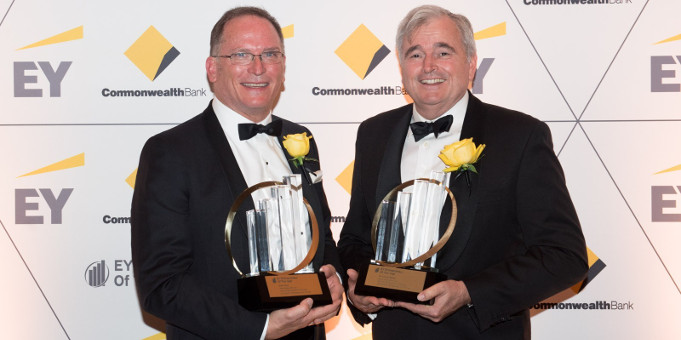
Founders of global healthcare organisation Aspen Medical, Dr Andrew Walker and Glenn Keys, have been best friends since school and last night the pair shared the title of 2016 Ernst & Young’s Australian Entrepreneurs Of The Year.
Aspen Medical provides healthcare services to challenging and under-resourced areas, including in outback Australia and the Solomon Islands, and after taking out the top prize at last night’s awards ceremony, Walker and Keys will now travel to Monaco to compete against entrepreneurs from over 60 countries for the title of EY World Entrepreneur of the Year, which was won by an Australian for the first time this year.
Walker told SmartCompany this morning he was thrilled to receive the award, despite being convinced he and his business partner “didn’t have a chance”.
Also taking home awards last night was Tim Gurner from real estate company GURNER, who won the emerging entrepreneur category, and Bec Scott from social enterprise STREAT, who won the social entrepreneur category.
Ray Dennis from lighting manufacturer Lightforce Australia took home the technology category, while Radek Sali from multivitamin brand Swisse claimed the industry category.The Honan family from food and industrial product manufacturer the Manildra Group received the EY Family Business Award of Excellence.
Walker and Keys founded Aspen in 2003. Today, the business employs over 2,200 people, and has a presence in “every continent except Antarctica”, says Walker. The business currently boasts revenue of over $300 million a year.
“[Keys] and I have been best mates since school, and we were both in the military together,” Walker says.
“After we left the military, he went on to work for some aerospace companies, and I started up a range of businesses, I think about nine or ten in total.”
Walker had experience in the health sector prior to the launch of Aspen, having founded the Australian Skin Cancer Clinics, which he later sold to medical centre operator IPN. The two wanted to funnel their military talents in logistics and planning into a successful business.
Much of Aspen’s business comes from government contracts, and the business is currently signed on with 52 military installations across Australia. Aspen has also done work with both the US and British governments.

Manny Stul, Glenn Keys, Andrew Walker, and Tony Johnson. Source: Supplied
“You do what you do and you don’t label yourself”
Despite the growth of their venture, Walker doesn’t immediately label himself as an entrepreneur.
“You do what you do and you don’t label yourself,” Walker says.
“Looking back we took something and added something to it to create value, and that’s a classic definition of what an entrepreneur is, and that’s what we’ve done.”
Walker thinks the award is more than recognition of he and Keys’ work, saying it is also recognition of the team behind Aspen.
“We run Aspen like a family business and we consider all our workers family. I know it’s a bit of a cliché but for us it’s true,” he says.
“Our staff are really world class, we’re loyal to them and they’re loyal to us. This award is a fantastic recognition of their achievements.”
The challenge of rapid growth
Walker admits he and Keys struggled in the early days, citing the difficulties associated with the businesses’ rapid expansion, along with challenges in dealing with different business cultures.
“When you’re starting up a business, growth costs money, be it through acquisitions or mistakes. You need working capital,” Walker says.
Walker recalls “looking down the barrel” of large bills and knowing they needed to find the money to pay both bills and staff wages.
“This is hard when you expand as rapidly as we did, we found that the management of our cash was absolutely critical,” he says.
Providing services in countries around the world has it’s obvious difficulties, with Walker saying the Aspen team also struggled with the diverse business landscapes of the places where the business operated.
“Down the track, we struggled with trying to understand the different business cultures, especially in places like Africa and the Middle East,” he says.
“In the United Arab Emirates we run an ambulance company, and it was hard to adapt to how they think and their unique business landscape. In places like Africa, they still believe in black magic, and if you don’t adapt to things like that you’re not going to be successful.”
Looking forward, Walker wants Aspen to be an “iconic Australian business” and is focusing on building the business’ legacy.
“When people think of healthcare we want them to think of Aspen. We hope to achieve this by taking Australian know-how to the world,” he says.
“We will well and truly be a billion-dollar-plus company, exporting Australian services to the world.”


COMMENTS
SmartCompany is committed to hosting lively discussions. Help us keep the conversation useful, interesting and welcoming. We aim to publish comments quickly in the interest of promoting robust conversation, but we’re a small team and we deploy filters to protect against legal risk. Occasionally your comment may be held up while it is being reviewed, but we’re working as fast as we can to keep the conversation rolling.
The SmartCompany comment section is members-only content. Please subscribe to leave a comment.
The SmartCompany comment section is members-only content. Please login to leave a comment.